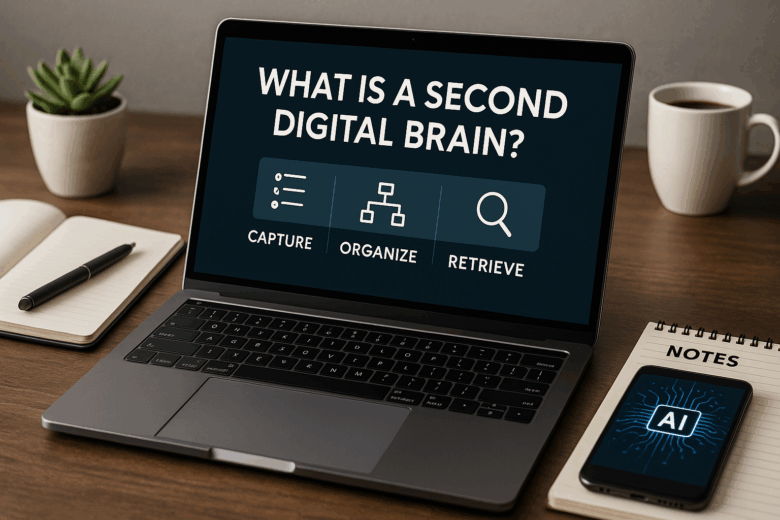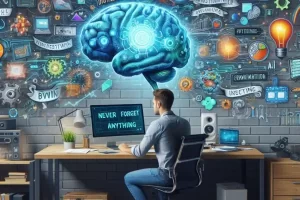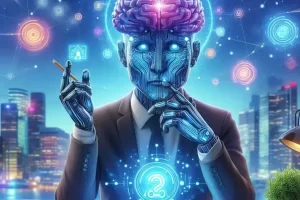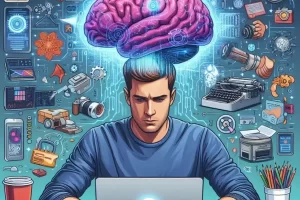In an age where information is everywhere, your brain is no longer the best place to store everything. From articles and notes to random ideas, we are bombarded with knowledge that gets lost without a reliable system. Enter the Second Digital Brain — a personalized knowledge management system enhanced by artificial intelligence. More than a productivity tool, it’s becoming a necessity in 2025.
In this article, we’ll explore what a second digital brain really is, how it works, and why it’s essential for professionals, students, and creators who want to stay sharp, organized, and creative in a data-heavy world.
What Is a Second Digital Brain?
A second digital brain is a system that allows you to store, organize, and retrieve information using digital tools. Think of it as a digital extension of your mind — a place to offload thoughts, knowledge, tasks, and memories.
Instead of letting important notes and ideas vanish into forgotten notebooks or scattered folders, your second brain acts like a central hub where everything you learn and think can be saved for future use.
Common tools used to build a second digital brain include:
- Notion
- Obsidian
- Evernote
- Google Keep
- Roam Research
- Readwise
- ChatGPT or other AI assistants
These platforms, especially when enhanced with AI, help you organize knowledge, create connections between ideas, and even surface forgotten insights.
Why the Concept Matters More Than Ever
As of 2025, the information economy is more demanding than ever. Professionals are expected to learn new skills rapidly, students juggle multiple streams of input, and creators are constantly collecting ideas.
Here are a few reasons why a second brain is no longer optional:
1. Information Overload Is Real
Every day, you encounter thousands of pieces of information: messages, emails, articles, podcasts, books, meetings, etc. Without a place to store and process this, your brain gets overwhelmed. A second brain filters and organizes everything so you don’t have to remember it all.
2. Your Brain Is for Thinking, Not Storage
Trying to remember everything reduces your capacity to focus and be creative. Your biological brain is great for ideas, but not for storage. Offloading memory to a digital brain frees up mental space for deeper thinking.
3. AI Can Now Help You Use What You’ve Stored
In the past, note-taking systems required manual organization. Now, with tools like ChatGPT, Notion AI, and Obsidian plugins, you can ask questions, summarize content, and find connections in your notes automatically.
4. Learning Becomes Exponentially Faster
When you consistently capture and review insights using a digital system, learning compounds. AI can help you review and reinforce key ideas, making your second brain a self-updating library of knowledge that grows smarter with you.
Key Components of a Second Digital Brain
Creating a second brain isn’t about downloading an app and hoping it works. It requires thoughtful structure. Here are the foundational components:
A. Capture System
You need a reliable way to quickly capture ideas and information:
- Bookmark articles
- Save highlights from books
- Take notes from meetings
- Record ideas on the go
Recommended tools: Readwise, Notion Web Clipper, Voice Memos, Email to Notion
B. Organization Layer
Once you capture content, you must make it retrievable later. This means organizing:
- Tags and categories (e.g., “Health”, “Marketing”, “Personal Development”)
- Project folders (e.g., “Podcast Launch”, “New Job Plan”)
- Time-based systems (e.g., “Weekly Notes”, “2025 Goals”)
AI can help by automatically suggesting tags, links, and summaries.
C. Retrieval and Search
This is where AI shines. You can now ask:
“What were the top lessons from the last 3 marketing articles I saved?”
Instead of digging through folders, your AI-enhanced second brain finds it instantly.
D. Review and Reflect
The magic of a second brain comes from regular reflection:
- Weekly or monthly reviews
- Revisiting saved quotes
- Connecting ideas across time
Tools like Notion AI, ChatGPT, and Readwise Review help create a habit of ongoing knowledge refinement.
Who Should Use a Second Digital Brain?
👩💼 Knowledge Workers
If you’re in marketing, design, writing, coding, or consulting, you constantly deal with complex information. A second brain ensures that you never lose great ideas or forget important lessons from your work.
🎓 Students and Lifelong Learners
Studying for exams, learning new skills, or reading academic material? Storing summaries, mind maps, and flashcards in a second brain can make studying more efficient and personalized.
🧠 Creators and Entrepreneurs
Creators often have bursts of inspiration. Capturing them in an organized way prevents them from fading. Your second brain becomes a creative vault you can revisit when building new projects.
👨👩👧 Busy Parents and Everyday Planners
Even outside of work, managing a family, planning trips, and tracking personal goals becomes easier when your thoughts and plans live in a structured digital system.
How AI Supercharges Your Second Brain
AI doesn’t just help store information — it transforms how you interact with it.
Here are practical AI applications:
- Smart Summaries: Turn long texts into digestible insights
- Contextual Search: Ask questions instead of using keywords
- Idea Suggestions: Let AI connect your ideas and prompt new ones
- Task Management: AI helps turn notes into actionable steps
With models like GPT-4 and tools like Notion AI or Obsidian’s AI plugins, your second brain can function as a thinking partner.
Common Mistakes When Building a Second Brain
- Overcomplicating It
Keep your system simple enough to use daily. Don’t let it become a chore. - Never Reviewing Notes
Saving info isn’t enough. You must revisit and use what you capture. - Neglecting AI Integration
If you ignore automation and AI tools, you miss out on time-saving features. - Duplicating Tools
Stick with 2–3 core platforms that integrate well, instead of hopping between apps.
Getting Started: Your Action Plan
Here’s how to start building your second digital brain today:
- Pick a central platform (Notion, Obsidian, etc.)
- Create capture habits (Save articles, jot notes, highlight books)
- Use AI tools to organize and summarize
- Review weekly to reflect and refine your system
- Let it evolve — don’t aim for perfection from day one
Your second brain is meant to grow with you.
Final Thought: Your Mind Deserves a Backup
Imagine never forgetting an idea, insight, or lesson again.
In 2025, the combination of human curiosity and AI assistance gives us an edge like never before. Your second digital brain is not just a productivity tool — it’s a strategic extension of your mind that works 24/7 to support your goals.
Once you build it, you’ll wonder how you ever lived without it.




